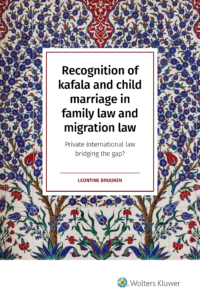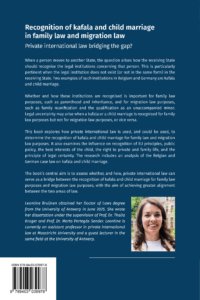Views
Brazilian Supreme Court on the Hague Child Abduction Convention
Guest post by Janaína Albuquerque, International Family Lawyer; Research Associate at the NOVA Centre for the Study of Gender, Family and the Law; Legal Coordinator at Revibra Europa. Janaína represented Revibra, Instituto Maria da Penha and Instituto Superação da Violência Doméstica as amici curiae in the cases discussed below.
The Brazilian Supreme Court has recently delivered a landmark judgment in two Direct Actions of Unconstitutionality (Ações Diretas de Inconstitucionalidade, or ADIs), namely ADI 4245 and ADI 7686, concerning the application of the 1980 Hague Convention on the Civil Aspects of International Child Abduction(1980HC). Despite their denomination, these actions did not aim to invalidate the Convention, but rather to harmonize its interpretation with the principles enshrined in the Brazilian Federal Constitution.[1] Read more
EU modernises consumer dispute resolution: An overview of the new ADR Directive
By Alexia Kaztaridou (Linklaters)
On 25 September 2025, the Internal Market and Consumer Protection Committee (IMCO) of the European Parliament approved the text of the political agreement on the Alternative Disputes Resolution for Consumer Disputes Directive. This Directive establishes a framework for resolving through ADR procedures contractual domestic and cross-border consumer disputes arising from the sale of goods or provision of services between consumers and traders within an EU context. The amendments to the prior Directive aim to modernise the existing framework in light of new consumer trends, such as the growth of e-commerce, and bring significant changes across several areas, enhancing the protection for consumers and clarifying obligations for traders and ADR entities. The Directive maintains its minimum harmonisation approach, allowing Member States to provide for stronger consumer protection. Read more
US Supreme Court: Judgment in Smith & Wesson Brands, Inc. et al. v. Estados Unidos Mexicanos (Mexico) – A few takeaways

Written by Mayela Celis, Maastricht University
In June 2025, the US Supreme Court delivered its opinion in Smith & Wesson Brands, Inc. et al. v. Estados Unidos Mexicanos (Mexico) 605 U.S. 280 (2025). The Opinion is available here. We have previously reported on this case here, here and here (on the hearing).
As previously indicated, this is a much-politicized case brought by Mexico against US gun manufacturers, alleging inter alia negligence, public nuisance and defective condition. The basic theory laid out was that defendants failed to exercise reasonable care to prevent the trafficking of guns to Mexico causing harm and grievances to this country. In this regard, the complaint focuses on aiding and abetting of gun manufacturers (rather than of independent commission).
In a brilliant judgment written by Justice Kagan, the Court ruled that PLCAA bars the lawsuit filed by Mexico. Accordingly, PLCAAS’s predicate exception did not apply to this case. Read more
News
List of China’s Cases on Recognition of Foreign Judgments [2025 Update]


As the new year begins, it’s a good time for a fresh start. One timely occasion to do so is the release, on 31 December 2025, of the annual update of the List of China’s Cases on Recognition of Foreign Judgments (Case List), prepared since 2019 by China Justice Observer (CJO), founded by Guodong Du and Meng Yu (updates for the years 2020, 2022, 2023, and 2024 were also previously posted on this blog).
The Case List is compiled on the basis of a collection of “all Chinese court decisions involving the recognition and enforcement of foreign judgments (REFJ), as well as foreign decisions concerning the recognition and enforcement of Chinese judgments.” The stated intention behind this endeavor is to “build reasonable expectations on REFJ in China.”
The Case List constitutes a particularly valuable source of information on judicial practice relating to the recognition and enforcement of foreign judgments in China, both under international treaties concluded by China (for a full list, see here) and under domestic law, namely the Civil Procedure Law of the People’s Republic of China (2023 Amendment), Articles 298–303.
According to the 2025 update, a total of 120 cases involving China and 26 foreign States and regions, excluding foreign divorce judgments, have now been collected. This represents an increase of 11 cases compared to the previous update (109 cases in the 2024 update).
Key features of the 2025 update include the following:
-
The List comprises 26 concise reports for each jurisdiction, together with a chart of bilateral judicial assistance treaties which China has concluded with 39 States, of which 35 bilateral treaties include judgment enforcement clauses.
-
A total of eleven newly added cases involve one treaty jurisdiction – Uzbekistan (one case), and five non-treaty jurisdictions, namely, Australia (one case), New Zealand (four cases), Singapore (two cases), South Korea (two cases), and the United States (one case).
-
Please note that Tian v Xu [2023] NZHC 3259 marks the first reported instance of a New Zealand court recognizing and enforcing a Chinese civil settlement statement (also known as a mediation judgment). By treating such instruments as equivalent to consent judgments, the New Zealand High Court has adopted a pro-enforcement approach consistent with precedents in Canada (Wei v Li 2019 BCCA 114) and Australia (Bank of China Limited v Chen [2022] NSWSC 749), providing a clear contrast to the earlier restrictive view expressed in Singapore (Shi Wen Yue v Shi Minjiu & Anor [2016] SGHC 137).
-
Another noteworthy case is Sunvalley Solar Inc. v Baoding Tianwei Solarfilms Co. Ltd. (2019) Ji 01 Xie Wai Ren No. 3, where a Chinese court refused to enforce a U.S. default judgment rendered in breach of a valid arbitration agreement. By holding that a defendant’s absence does not constitute an implied waiver, the Chinese court shielded arbitration clauses from being bypassed via foreign default judgments.
-
Other newly added cases, be it foreign judgments to be enforced in China or Chinese judgments to be enforced in foreign jurisdictions, provide a valuable comparative perspective on key issues in the eyes of courts from different jurisdictions, such as reciprocity ( e.g., the de jure reciprocity applied by a Beijing court in enforcing a South Korean IP judgment, the reciprocal consensus confirmed by a Shanghai court in enforcing a Singapore monetary judgment), natural justice (New Zealand), ascertainment and interpretation of foreign law (Singapore, Australia).
-
Each case has been reviewed, and more details, such as the grounds, the case numbers, and causes of action, have been added.
-
Case analyses have been aggregated under the country tags since 2022, so it is now easier to track down relevant cases, together with their information and analyses, in each country/region report. For example, under the tag ‘US-China Judgments Recognition and Enforcement’, one can find relevant case analyses involving mutual recognition and enforcement of judgments between the US and China.
For further details see here and here.
Happy New Year to all!

[Out Now] Bruijnen on Recognition of Kafala and Child Marriage in Family Law and Migration Law


Leontine Bruijnen (Maastricht University) has recently published a book titled Recognition of kafala and child marriage in family law and migration law (Wolters Kluwer, 2025) based on her dissertation written under the supervision of Prof. Dr. Thalia Kruger and Prof. Dr. Marta Pertegás. Read more
Out Now: Un Derecho Internacional Privado centrado en los derechos de las personas (Tirant lo Blanch 2025)
By Eduardo Álvarez-Armas, Assistant Professor of Law at the Universidad Pontificia Comillas (Spain) and Université Catholique de Louvain (Belgium)
Earlier this year, publishing house Tirant Lo Blanch released “Un Derecho Internacional Privado centrado en los derechos de las personas” (Private international law as focused on the rights of individuals), a volume that compiles the papers presented in the “VII Seminario AEPDIRI sobre temas de actualidad de Derecho Internacional Privado”, the 7th workshop on trending topics in private international law organized by the Spanish Association of International Law and International Relations Professors. These workshops on trending topics, initiated in 2015, have become one of the most significant academic activities of the Asociación Española de Profesores de Derecho Internacional y Relaciones Internacionales (AEPDIRI). They provide a yearly forum for collective reflection on the most dynamic and debated questions in each of the association’s academic branches (public international law, private international law and international relations), enhancing the exchange of research and practice ideas among academics, judges, and legal professionals, from Spain and beyond.



